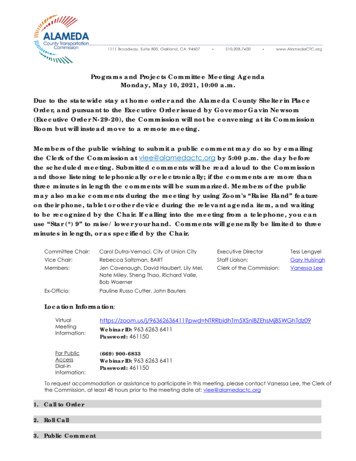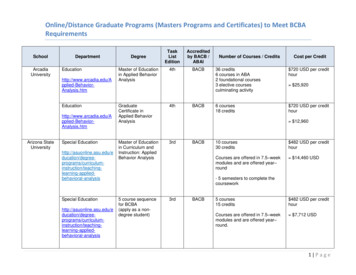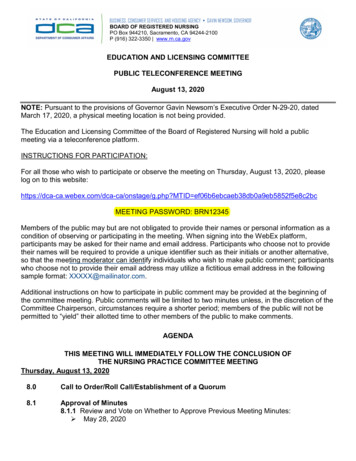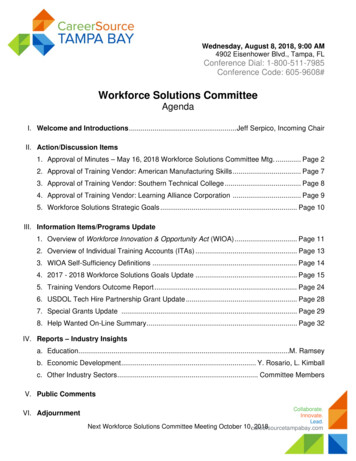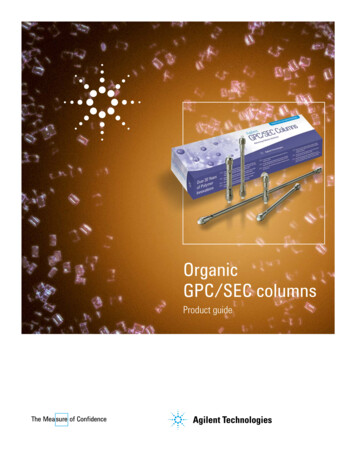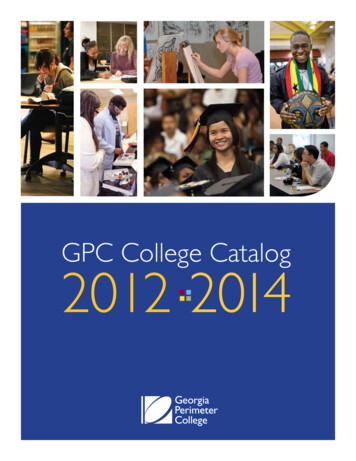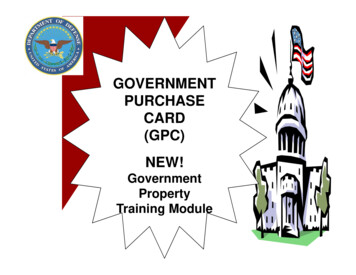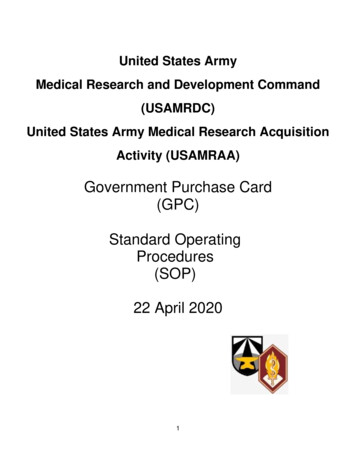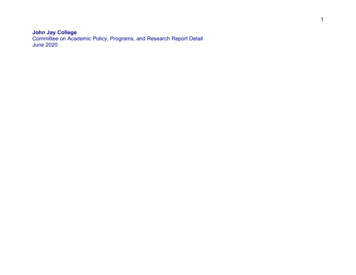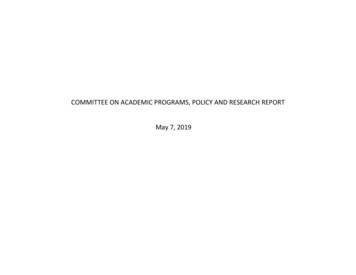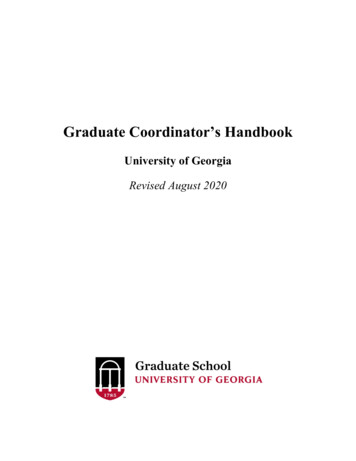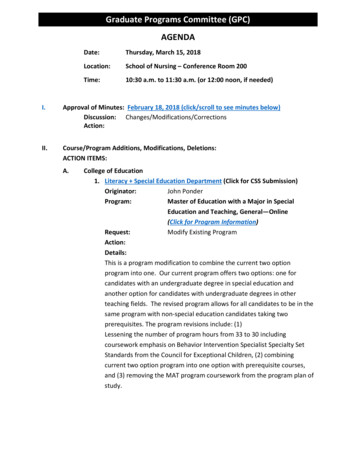
Transcription
Graduate Programs Committee (GPC)AGENDADate:Thursday, March 15, 2018Location:School of Nursing – Conference Room 200Time:10:30 a.m. to 11:30 a.m. (or 12:00 noon, if needed)I.Approval of Minutes: February 18, 2018 (click/scroll to see minutes below)Discussion: Program Additions, Modifications, Deletions:ACTION ITEMS:A.College of Education1. Literacy Special Education Department (Click for CSS Submission)Originator:John PonderProgram:Master of Education with a Major in SpecialEducation and Teaching, General—Online(Click for Program Information)Request:Modify Existing ProgramAction:Details:This is a program modification to combine the current two optionprogram into one. Our current program offers two options: one forcandidates with an undergraduate degree in special education andanother option for candidates with undergraduate degrees in otherteaching fields. The revised program allows for all candidates to be in thesame program with non-special education candidates taking twoprerequisites. The program revisions include: (1)Lessening the number of program hours from 33 to 30 includingcoursework emphasis on Behavior Intervention Specialist Specialty SetStandards from the Council for Exceptional Children, (2) combiningcurrent two option program into one option with prerequisite courses,and (3) removing the MAT program coursework from the program plan ofstudy.
Rationale:B. To create a competitive, innovative and attractive program. To meet the current needs of schools in our region for candidatestrained in behavior intervention. To streamline course offerings with the intent for efficient scheduling.Tanner Health System School of Nursing1. Master of Science in Nursing (MSN) ProgramOriginator:Sally RichterProgram:Health Systems Leadership – Clinical Nurse LeaderTrack (Click for Program Information)Request:Add (New Plan of Study – Full Time Part Time)Action:Details:These new plans of study (full time part time) will encompass existingcourses during the summer semester, which the previous plans of studydid not offer. The individual semester hours are reduced with theinclusion of the summer semester.Rationale:The adoption of these new plans of study will attract nurses to thegraduate program and increase enrollment due to the reduced overallsemester hours, which benefits the adult learner. Many graduatestudents in the CNL track are working fulltime as nurses and based uponpreviously collected SWOT data requested the inclusion of summercourses and a reduced semester workload.2. Master of Science in Nursing (MSN) ProgramOriginator:Sally RichterProgram:Health Systems Leadership – Nurse Leader/Manager Track (Click for Program Information)Request:Add (New Plan of Study – Full Time Part Time)Action:Details:These new plans of study (full time part time) will encompass existingcourses during the summer semester, which the previous plans of studydid not offer. The individual semester hours are reduced with theinclusion of the summer semester.
Rationale:The adoption of these new plans of study will attract nurses to thegraduate program and increase enrollment due to the reduced overallsemester hours, which benefits the adult learner. Many graduatestudents in the Leader/Manager track are working fulltime as nurses andbased upon previously collected SWOT data requested the inclusion ofsummer courses and a reduced semester workload.3. Master of Science in Nursing (MSN) ProgramOriginator:Sally RichterProgram:Nursing Education(Click for Program Information)Request:Add (New Plan of Study – Full Time Part Time)Action:Details:These new plans of study (full time part time) will encompass existingcourses during the summer semester, which the previous plans of studydid not offer. The individual semester hours are reduced with theinclusion of the summer semester.Rationale:The adoption of these new plan of study will attract nurses to thegraduate program and increase enrollment due to the reduced overallsemester hours, which benefits the adult learner. Many graduatestudents in the Nursing Education program are working fulltime as nursesand based upon previously collected SWOT data requested the inclusionof summer courses and a reduced semester workload.4. Master of Science in Nursing (MSN) ProgramOriginator:Sally RichterCourse:NURS 6102: Role of the Caring HealthcareProfessional (Click for Course Information)Request:Modify (Credit Hour Change)Action:Details:A change in the semester credit hours for NURS 6102: Role of the CaringHealthcare Professional from 2-0-2 to 3-0-3 is requested.Rationale:This change in semester credit hours for an existing course is requesteddue to faculty and student feedback regarding the inability to meetcurrent course outcomes with the two-hour credit structure. An increasein semester credit hours from 2-0-2 to 3-0-3 for the course will enablefaculty to meet all current course outcomes and also ProfessionalStandards for accreditation purposes.
5. Master of Science in Nursing (MSN) ProgramOriginator:Sally RichterCourse:NURS 6109: Informatics, Technology, andHealthcare Outcomes (Click for CourseInformation)Request:Modify (Credit Hour Change)Action:Details:A change in the semester credit hours for NURS 6109: Informatics,Technology, and Healthcare Outcomes from 2-0-2 to 3-0-3 is requested.Rationale:This change in semester credit hours for an existing course is requesteddue to faculty and student feedback regarding the inability to meetcurrent course outcomes with the two-hour credit structure. An increasein semester credit hours from 2-0-2 to 3-0-3 for the course will enablefaculty to meet all current course outcomes and also ProfessionalStandards for accreditation purposes.III.Old BusinessN/AIV.New BusinessAssignment of Comprehensive Program Reviews (Need two volunteers per program—not from the College of Education). NOTE: Media Specialist Program can be the samereviewers due to the fact the programs are very similar in nature. CPRs in need ofreview include: College of Education: Educational Leadership Program College of Education: Second Education – M.A.T. Program College of Education: Media Specialist – Ed.S. Program College of Education: Media Specialist – M.Ed. Program(Click here for Comprehensive Program Review Instructions)IV.Adjournment
Faculty Senate – Graduate Programs Committee 2017-2018 Member ListSenate MembersWebb, Susan Hall (Chair)swebb@westga.eduSenate—RCOB (2018)Varga, Mattmvarga@westga.eduSenate--COE (2018)Bertau, Marie Cecilembertau@westga.eduSenate—COSS (2020)Khodkar, Abodollahakhodkar@westga.eduSenate—COSM (2020)Vasconcellos, Colleencvasconc@westga.eduSenate--COAH (2020)Faculty MembersBerding, Christycberding@westga.eduSON (2018)Rogers, Shelleyshelley@westga.eduLibrary (2018)Skott-Myhre, Kathleenkskott@westga.eduCOSS (2018)Austin, Adrianaaustin@westga.eduRCOB (2019)Fain, Christiafain@westga.eduCOE (2019)Genz, Janetjgenz@westga.eduCOSM (2019)Harrison, Rebeccarharriso@westga.eduCOAH (2019)AdministratorsOverfield, Denisedoverfie@westga.eduAdministrator – Dean,Graduate School(Associate VP)Jenks, Daviddjenks@westga.eduAdministratorAssociate VP forAcademic AffairsStudentHogle, RaeAnnarhogle1@my.westga.eduStudent Representative
Graduate Programs Committee (GPC)e Programs Committee (GPC)MINUTESDate:Thursday, February 15, 2018Location:Virtual Committee Meeting Using QualtricsLink to SV 08mgk1yjxZeju3bPresent:A. Austin; C. Berding; M. Bertau; C. Fain; J. Genz; R. Harrison; A. Khodkar; K.Skott-Myhre; S. Rogers; M. Varga; C. Vasconcellos; S.H. WebbAbsent:N/AIII.Approval of Minutes: January 18, 2018 (click/scroll to see minutes below)Discussion: /PassedCourse/Program Additions, Modifications, Deletions:ACTION ITEMS:A.College of Education1. Communication Sciences Professional Counseling DepartmentOriginator:Julia Whisenhunt/Matt VargaProgram:Master of Education with a Major in ProfessionalCounseling – School Counseling Track (click forprogram modification details)Request:Modify Existing Program (Increase Credit Hours)Action:Approved/PassedDetails:The M.Ed. in Professional Counseling, School Counseling concentration,must transition from a 48-hour format to a 60-hour format in order toremain compliant with accreditation standards. The proposedmodification will remove MEDT 6401 from the program and replace itwith a counseling content course. The PSC standards previously met
through MEDT 6401 will be addressed in CEPD 7121 and throughoutthe curriculum. The following course-level learning objective in CEPD7121 specifically addresses technology in School Counseling: "Studentswill demonstrate a knowledge and understanding of the use oftechnology in school counseling, research, program delivery, andevaluation." This learning objective aligns with CACREP standardsII.F.1.j. and II.F.5.e. and PSC standard 4.vii. The proposed modificationwill add 12 credit hours to the program. With the addition of these 12hours and the removal of MEDT 6401, the following 15 hours willconstitute new program courses: (a) CEPD 7153, Crisis Intervention, (b)CEPD 7134, Couples and Family Counseling, (c) CEPD 7155, SubstanceAbuse Counseling, (d) CEPD 7121, Special Topics in School Counseling,and (e) CEPD 7111, Diagnosis and Treatment of Mental and EmotionalDisorders.Rationale:The Council for the Accreditation of Counseling and Related EducationalPrograms (CACREP) standard I.J. states that, “beginning July 1, 2020, allentry-level degree programs require a minimum of 60 semester credithours or 90 quarter credit hours for all students.” This standard appliesspecifically to all 48-hour CACREP accredited programs in the specialtyarea of School Counseling. The M.Ed. in Professional Counseling, SchoolCounseling concentration, program at University of West Georgia ispresently accredited by CACREP in a 48-hour format under the 2009standards. The current program accreditation runs through October 31,2023. However, regardless of current accreditation end dates, allCACREP accredited programs in School Counseling must transition tothe 60-hour format no later than June 30, 2020. As such, the M.Ed. inProfessional Counseling, School Counseling concentration, program atUWG needs to transition from a 48-hour format to a 60-hour formatwith full implementation no later than June 30, 2020 in order to remaincompliant with current accreditation standards. The program facultyare seeking early conversion, with implementation in Spring 2019, toremain competitive with similar CACREP accredited School Counselingprograms that have already transitioned to the 60-hour format and toensure that the program is fully compliant prior to the June 30, 2020deadline.2. Communication Sciences Professional Counseling DepartmentOriginator:Julia WhisenhuntProgram:CEPD 7121 – Special Topics in School Counseling(click for new course details)Request:Add (New Course)
Action:Approved/PassedDetails:This course provides an introduction to various professional issues,current topics, and trends related to the profession of schoolcounseling. Emerging issues in the field, such as those identified byCACREP and the PSC, will serve as a foundation for this course. Relevanttopics may include, but are not limited to, the role of addiction inschool counseling, strategies for school-based consultation andcollaboration, instructional technologies relevant to school counseling,career and college readiness, differential instruction, and datainformed school counseling programming procedures.Rationale:The Council for the Accreditation of Counseling and Related EducationalPrograms (CACREP) is transitioning to a 60-credit hour SchoolCounseling program requirement, effective June 30, 2020. As such, theM.Ed. in Professional Counseling, School Counseling concentration,program needs to transition from a 48-hour format to a 60-hour formatno later than June 30, 2020. In reviewing CACREP and ProfessionalStandards Commission (PSC) standards and comparing those standardsto our existing curriculum, it is evident that the program should createa course that addresses special topics and current trends in the schoolcounseling profession. With that in mind, the proposed course is meantto accomplish three primary goals: (1) provide a curricular vehiclethrough which to address trends and issues in the profession as theyemerge and change; (2) enhance student understanding and ability toapply mainstream professional counseling topics (e.g., crisis andtrauma, addiction, family therapy, etc.) to the school counselingenvironment; and (3) foster student comprehension and skill related tothe role of technology in school counseling. This course will be a newacademic requirement for students who enroll in the 60-hour SchoolCounseling concentration, which the program faculty will imminentlysubmit for approval.INFORMATION ITEMS:A.Division for Academic Affairs1. Graduate SchoolOriginator:Denise OverfieldPolicy:GRE Score Policy (Click for Policy Information)Request:Add (Catalog Description)Details:Approved/Passed
The only official reports of Graduate Record Examination (GRE) scores arethose issued by ETS and sent directly to the University of West Georgiausing our school code: 5900. Scores obtained from other sources or sentin other formats will not be accepted. Scores must be current, takenwithin 5 years of the application deadline date for the specific program ofstudy. Academic programs may offer an exemption or waiver for the GREunder specific circumstances that must be outlined in the graduatecatalog. Please consult the program of study’s admission criteria for moreinformation. Once received, the University of West Georgia will not issueor release GRE scores to students, applicants, or other institutions in anyformat.2. Graduate SchoolOriginator:Policy:Denise OverfieldAdmission as a UWG Undergraduate-GraduatingSenior (Click for Policy Information)Modify (Catalog Admission as a UWG Undergraduate-Graduating Senior: A UWGundergraduate senior within 8 hours (instead of 6) of completingrequirements for a bachelor’s degree may be permitted to enroll incourses for master’s degree (from graduate) credit provided that (removehe or she meets) the following conditions are met:1.The UWG student must obtain the permission of the DepartmentChair and Graduate Program Director that schedule and/or provideadvising for the master’s degree graduate course/s. Permission must alsobe given by the Dean of the college or school of the undergraduatemajor.2.The UWG student is qualified for admission to master’s degreegraduate study except for the award of the undergraduate degree.3.The UWG student registers for no more than twelve (12) (from 9hours) semester credit hours. For example, a student who needs eight (8)hours (from 6) to complete the baccalaureate degree could register forthose eight (8) (from 6) undergraduate hours plus an additional four (4)hours (from 3) of master’s degree (was graduate) credit. The graduatecredit would apply to a master’s (was graduate) degree, essentiallyaccelerating the student’s completion of a master’s degree afteradmission to a UWG master’s program. Under no circumstances may acourse be used for both graduate and undergraduate credit.
B.College of Social Sciences1. Political Science Department (Click for CSS Submission)Originator:Sooho LeeProgram:Information)Master of Public Administration (Click for ProgramRequest:Modify Existing Program (Admission Requirements)Action:Approved/PassedDetails:The MPA program requests the following changes in the MPAadmission policy:1. GPA- Current: GPA of at least 2.5- New: A minimum 2.5 cumulative grade average (GPA) equivalent on a4.0 scale2. GRE Requirement- Current: Official GRE total score of 291 (combining verbal andquantitative)- New: A minimum total score of 291 (combining Verbal andQuantitative) on the Graduate Record Examination (GRE). However, thefollowing are eligible for a GRE Waiver:- Applicant with an earned graduate degree from an accreditedinstitution- Applicant with an earned undergraduate degree with an overallGPA of 3.0 or higher from an accredited institution- Applicant with an earned undergraduate degree with an overallGPA of 2.75 from an accredited institution and at least 3 yearsprofessional, full-time, public sector or nonprofit career experience- Applicant with a public or nonprofit work experience of at least 7or more years in a full-time, relevant supervisory position3. Letters of Recommendation- Current: 3 letters of recommendation- New: Two letters of recommendation from former professors or fromjob supervisors.
4. Personal Statement- Current: not required- New: A personal statement of about 1,000 words that describes theapplicant’s work experience, professional goals, the reasons they havechosen this program, why they want to attend UWG, and how the MPAprogram will help the applicant achieve the goals.5. Resume- Current: Not required- New: A current resume6. Transfer credit- Current: 6 credit hours- New: Applicants may transfer up to 6 semester hours of graduatework from other accredited institutions. To be transferred, course workfrom other institutions must correspond to UWG’s MPA curriculum.Applicants should provide syllabi and detailed course descriptions andthe amount of credit granted will be determined by the programdirector. Such transferred course work may be no more than five yearsold.Rationale:The detailed rationale and background are explained in the attachedfile.1. GPA: The new change provides a better clarification.2. GRE: The Program requires GRE for all applicants, while many otheraccredited institutions, especially the institutions (Kennesaw State,Georgia State, and Georgia College & State) near our campus, have awaiver policy for this requirement (see IV. Appendix: Admission PolicyComparison). The waiver policies ease the burden of preparing theadmission requirements for applicants and expedite the overalladmission process. In particularly, in-service professionals in public &nonprofit organizations and students who have a high GPA ofteninquire of a GRE waiver. With a waiver policy, the program will be morecompetitive. This new waiver policy will reduce some burden for futureapplicants and improve application rate, particularly good for aspiringin-service applicants who decide to apply close-to-deadline and cannotget a GRE take in time. The change will be beneficial for a competitiveedge. In addition, recent studies do not find that GRE has criterion
validity in estimating students’ academic performance in MPAprograms3. Letters of Recommendation: Two recommendation letters willreduce the burden for applicants to prepare their admissiondocuments. Kennesaw State, require only two. Recommendationletters also have weak validity in the estimation of studentperformance.4. Personal Statement: Currently the Program does not require anypersonal statement or essay for the admission. An essay or personalstatement about professional plan and goal is necessary for bettermentoring students through their coursework. One of the new policiesthat the MPA program has launched is Student Learning Portfolio inwhich identifying students’ career plan and goal in the early stage oftheir study is extremely important. With a reduction of therecommendation letters, the Program can better accommodate theirneeds by adding this goal statement essay. By doing this, the Programcan better guide/accommodate their needs and goals while they arepursuing the degree. This is a necessary part of Student LearningPortfolio. In addition, it will give the Program an idea of their writingskill.5. Resume: Currently a current resume is not required. However, it isnecessary to see applicants’ entire track of experiences, achievements,and potentials, for accurate admission evaluation and advisement aftertheir admissions.6. Tra
Graduate Programs Committee (GPC) AGENDA Date: Thursday, March 15, 2018 Location: School of Nursing – Conference Room 200
